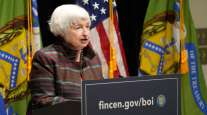Fed's Yellen Sees Rate Hikes Ahead, But Few Hints on When

PHILADELPHIA — Federal Reserve Chair Janet Yellen on June 6 gave a largely upbeat assessment of the U.S. economic outlook and said interest rate hikes are coming, but, in an omission that stood out to some investors, gave little sense of when.
Overall, Yellen said, "I see good reasons to expect that the positive forces supporting employment growth and higher inflation will continue to outweigh the negative ones."
While last month's jobs report, released June 3, was "disappointing" and bears watching, policymakers will respond "only to the extent that we determine or come to the view that the data is meaningful in terms of changing our view of the medium- and longer-term economic outlook," Yellen said.
Though she stressed surprises could emerge that could change her expectations, and listed four main risks to the U.S. economy — slower demand and productivity, and inflation and overseas risks — she concluded by downplaying them all and flagging her expectation that "further gradual increases in the federal funds rate are likely to be appropriate."
Still, Yellen was careful not to give any hints about the timing of a next rate increase, in contrast to a speech May 27, when she said such a move would probably be appropriate "in coming months."
To some investors, the absence of a timeframe in her June 6 remarks suggests the Fed will delay its next rate hike well beyond next week, when U.S. central bankers next gather to make monetary policy.
Economists now see September or possibly July as the most likely time for a quarter-point policy tightening, while traders in futures markets are betting on later in the year.
But to others, Yellen's repeated emphasis on the positive aspects of recent economic data continues to suggest a rate hike in the near future.
"The fact that she did remove that timeframe I think just suggests that June’s off the table, July is possible if the data cooperates," said Omar Esiner, chief market analyst for Commonwealth Foreign Exchange in Washington. "She’s a little bit more upbeat in that respect than the Street, and I think that was a main takeaway for me.”
The U.S. central bank raised rates from near zero in December in the first U.S. policy tightening in nearly a decade.
Prospects of another hike this month were all but killed by a report last week showing only 38,000 jobs were created in May, somewhat muting recent upbeat data on consumer spending, housing and overall U.S. growth.
Although the jobs report was "concerning, let me emphasize that one should never attach too much significance to any single monthly report," Yellen said at the World Affairs Council of Philadelphia. "Other timely indicators from the labor market have been more positive."


